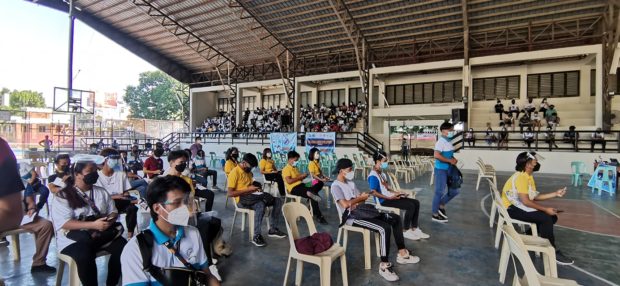CHEd targets January for limited in-person classes in low-risk areas
College students in La Union province wait for their turn to receive jabs against COVID-19. (Photo courtesy of Commission on Higher Education-Ilocos region
MANILA, Philippines — Commission on Higher Education (CHEd) chairman Prospero de Vera said the commission is eyeing the possible opening of limited face-to-face classes for all programs in low-risk areas by January next year, but said numerous factors are still being studied.
“Pinagaaralan pa natin yan. Nagsisimula pa lang tayong gumawa ng guidelines,” De Vera said during Friday’s Laging Handa briefing.
ADVERTISEMENT
(We are still studying that. We are starting to craft the guidelines.)
“Ang tinatarget natin diyan ay matapos ang guidelines maybe November, December at titignan natin kung anong kalagayan on the ground by January kung pwede na ito,” he added.
Atienza tells Bongbong: You’re not a millennial to be ignorant of martial law atrocities
Matibag calls Senate budget hearing ‘political,’ gets kicked out
Duterte inaugurates P684-M bypass road project in Quezon
(We are aiming to finish the guidelines maybe in November, December and we will see the status on the ground if we can allow that in January.)
“Kasi mababa pa ang vaccination level ng mga estudyante, 27 perent pa lang. ‘Di natin pwedeng isugal ang kalagayan nga mga estudyante at ng kanilang pamilya kung mababa ang level ng vaccination,” he further said.
(Because the vaccination level among students is still low, only 27 percent. We can’t risk the welfare of our students and their family because the vaccination rate is still low.)
According to De Vera, the level of risk and the vaccination rate of students, faculty members as well as other residents in localities are being considered in the opening of face-to-face classes for all courses.
Further, he said coordination with the local governments is also needed.
“Kasama rin sa usapan ang local government…Hindi pwedeng yung eskwelahan lang yung titignan mo dahil ang mga estudyante ay magbabihaye mula sa kanilang bahay hanggang eskwelahan. Sasakay ng public transportation yan,” De Vera explained.
(The local governments are part of the consideration. We can’t just depend on the decision of the institutions because students need to commute from their homes to their schools. They need public transportation for that.)
ADVERTISEMENT
He said questions should be raised if public transportation in an area has the capacity to observe minimum health protocols to safely ferry students to their respective schools.
“Nabakunahan na ba ang mga tricycle drivers saka mga jeepney driver?” De Vera said.
(Are the tricycle drivers, jeepney drivers already vaccinated?)
“So kailangan mag-ugnayan sa local government, kailangan mataas ang vaccination level hindi lang sa school kundi doon sa lugar, paligid ng eskwelahan,” he added.
(So there is a need to coordinate with the local government, the vaccination level should be high in the area of the schools.)
He said the coordination with local governments is important since they will be involved in contract tracing and isolation efforts should a student contract COVID-19.
“Kapag may nagkasakit diyan, ang sasalo diyan ay hindi lamang eskwelahan, local government din. Kasamang magko-contact trace, magpapa-quarantine ng mga estudyante so kung hindi kumbinsido at hindi natin kasama ang local government sa pagpaplano, mahirap hong agad agad na buksan ang mga pamantasan,” he added.
(If someone gets sick, not only will the school be involved but as well as the local government. They are involved in the contact tracing and in placing students in quarantine so if the local government is not convinced, it will be hard to immediately open the schools.)
In September, President
Rodrigo Duterte
approved the expansion of limited in-person classes for degree programs requiring “hands-on experience” in higher education institutions located in areas under the government’s most lenient quarantine classification.
EDV
Subscribe to our daily newsletter
For more news about the novel coronavirus click
here.
What you need to know about Coronavirus.
For more information on COVID-19, call the DOH Hotline: (02) 86517800 local 1149/1150.
The Inquirer Foundation supports our healthcare frontliners and is still accepting cash donations to be deposited at Banco de Oro (BDO) current account #007960018860 or donate through PayMaya using this
link
.
Read Next
Some LGUs want their cemeteries open for 2 days during ‘Undas’ — LPP
EDITORS’ PICK
MOST READ
Don’t miss out on the latest news and information.
View comments



